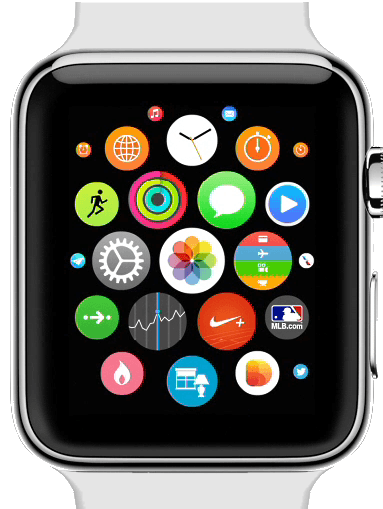After years of speculation, Apple finally unveiled its smartwatch on September 9, 2014. The simply named Apple Watch, and not the widely assumed iWatch, will arrive in early in 2015, and is expected to retail at $350. Because it’s an Apple product, you can expect a plethora of popular features that could make the Apple Watch a game-changer in the world of wearable tech.
The Apple Watch will include features like Siri, Apple Pay, a heart rate monitor, iTunes/Apple TV navigation, automatic time zone adjustment, and the ability to dictate messages or have short phone calls. However, those features may not be enough to convince consumers in purchasing the Apple Watch. A flash survey conducted following the announcement of the Apple Watch found that only 33% of 1,000 Americans were interested in buying the watch.
 Image Source: Wikipedia
Image Source: WikipediaHowever, no matter how many people actually buy it, marketers shouldn’t ignore the potential of the Apple Watch. Remember, wearable tech remains a new territory, one that most people aren’t familiar with. It is possible that over time, people will warm up to the idea. And once people realize the benefits wearable tech offers, a product like the Apple Watch could become a must-have gadget – it’s not like Apple isn’t already a cultural a phenomenon.
Out of the all the features that the Apple Watch is capable of, the one that we’re most interested in is it’s potential impact on local search.
Importance of Local Search
One of the most important purchasing decisions for consumers today is local search. With the amount of people owning smartphones, tablets, and wearable gadgets growing, finding business near your location is easier than ever before.
Because of this growing trend, Google performed a study that examined the local search behavior of smart phone and computer/tablet users. The results were rather striking.
- 4 in 5 consumers use search engines to find local information.
- 50 percent of consumers who conducted a local search on their smart phone visited a store within a day, and 34 percent who searched on computer/tablet did the same.
- Local searches lead to more purchases than non-local searches. 18 percent of local searches on smart phone lead to a purchase within a day versus just 7 percent of non-local searches.
The study also found that four out of five consumers want ads customized to their city, zip code, or immediate surroundings. One final finding was that consumers believe it’s important to have directions and a call button appear on their smartphones.
In short, local search is extremely important for local businesses if they want to convert visitors into clients.
Apple Watch Features for Local Search
The Apple Watch presents a great opportunity for marketers who want to cash in on local search through some really amazing features, such as “haptic feedback”.
This “haptic feedback” feature is a part of Apple Maps. What makes it unique is that the Apple Watch’s Taptic Engine will give you a little tap on the wrist when you have to make a left or right turn while heading to your destination – and there are different buzzes for when it’s time to turn left or right. As Jayson DeMers explained in Forbes, this feature will “provide hands-free, eye-free directions with directional buzzes.”
This feature is accomplished by using the Siri interface, which utilizes Bing search results. Wearers can search for a local business through voice and then receive turn-by-turn directions via Apple Maps. Because of the small screen, it may difficult to input a search query or zoom-in or out. This could mean that search results will be in an extremely close radius, like within two blocks.
The biggest question right now is if Google Maps will be able to be accessed on the Apple Watch. As iPhone users are aware, you can get the Google Maps app. However, until Google Maps develops an app that also contains the “haptic feedback” feature, you may have to live without the app for now.
How to Optimize Local Search
There’s definitely potential for the Apple Watch to impact local search. But, it’s up to you to make sure your business has been optimized for local search. If you haven’t done so yet, here are a couple of pointers for optimizing local SEO.
Check Apple Maps
Unlike Google Maps, you can’t “claim your business” with Apple Maps. In other words, you won’t be able to create a profile. However, you can still report any problems to Apple. Check out your business on Apple Maps and make sure all of the correct and up-to-date information is listed – such as business name, location, phone number, and business hours.
Get Listed
As noted earlier, the Apple Watch will be using Bing as its default search engine. That means if you want your business to be found, you’re going to need to be listed on Bing – which you can do by claiming your business on Bing Places. That doesn’t, however, mean you should completely ignore the Big G. On top of being listed on Bing, you also need to claim your business on Google My Business – which will help customers find you on search, Maps, and Google+.
On both Bing and Google you want to make sure that you have a complete profile and follow their guidelines to ensure better results. If you need more assistance on local, you should review Moz Local, which used to be GetListed.org.
Be Present on Third Party Sites
Because local search results also rely on review sites – such as Yelp, Localeze and TomTom – you also have to have complete profiles there. Just like with Bing Places and Google My Business, you should have up-to-date information that provide visitors with your location, phone number, hours of operation and a link to your website or main social media account.
There’s also some great tips from fellow SEJ writer Amanda DiSilvestro on the SEMrush blog that can help you succeed with Yelp.
Use Digital Coupons
Digital coupons have the ability to improve your local search rankings. In fact, digital coupons are on the rise for smart phone users. According to a study by Forrester Consulting, on behalf of RetailMeNot.com,
“59% of consumers stated that of the different types of promotions a retailer can employ, digital coupons still hold the most sway when it comes to influencing a consumer’s purchasing decision.”
Furthermore, 68% of respondents stated that coupons increase brand loyalty.
If you want to gain a competitive edge, as well as improve your local search rankings, then you should offer digital coupons and special offers to your customers.
Conclusion
Even though the Apple Watch has yet to arrive on the market, local business owners and marketers should be excited about its potential. Unlike previous smart watches, the Apple Watch offers some interesting features that could boost sales for brick-and-mortar stores. As long as you optimize your local SEO, and are listed on Bing, Google, and Yelp, you should experience benefits for your local business, no matter what type of technology comes along.
Featured Image: MJTH via Shutterstock






![Google AIO: 4 Ways To Find Out If Your Brand Is Visible In Generative AI [With Prompts]](https://www.searchenginejournal.com/wp-content/uploads/2025/03/sidebar1x-187.png)